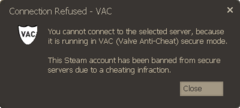Valve Anti-Cheat
| This topic is covered better by other wikis or sites. Please see the following links instead: |
Valve Anti-Cheat, abbreviated as VAC, is an anti-cheat solution developed by Valve Corporation as a component of the Steam digital game distribution platform.
Functionality
VAC-bans can apply to multiple games, even if you didn't cheat in them[1]. For example, users that cheat in Team Fortress 2 will be unable to play Counter-Strike: Source, Half-Life 2: Deathmatch, and Day of Defeat: Source. VAC-banned players are still able to play on all VAC-insecure servers on any game. If a Steam account has a phone number attached to it, any account also using that phone number will also be VAC banned, even if the other accounts do not own the game. However, this feature is not enabled for all games and is used at the discretion of the developer.
In the past, those who were VAC banned had all non-purchased items deleted from their Backpack. In the current version of Team Fortress 2, users who are VAC banned do not lose any items in their backpack. Instead, all items they have are stuck inside of their backpack and cannot be traded away, placed on the Steam Community Market, or transferred to other accounts in any way. This is done to prevent players from trading the items to another account and cheating again. These users are still able to purchase items off of the Mann Co. Store and use said items freely.
VAC bans are non-negotiable, however, if a VAC ban was issued incorrectly it will automatically be removed. The VAC system checks if any foreign processes are hooked into the player's local game binaries.
VAC functionality on different operating systems
The versions of VAC on Linux, Mac, and Windows are identical. This means each version of VAC works the same regardless of the platform it's running on. This originates from VAC being designed as client-level only, meaning that it can be easily maintained on various operating systems without harming security.
See also
References
- ↑ Steam support article - I've been VAC banned.
